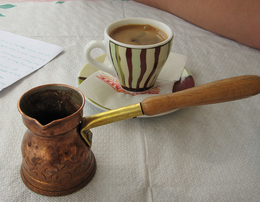 In the new study, published by SAGE Journals, Gerasimos Siasos, M.D., and professor at the University of Athens Medical School and his team of researchers set out to examined the association between chronic coffee consumption and endothelium function in elderly inhabitants of the Greek island, Ikaria. Inhabitants of this island have one of the highest longevity rates in the world with 1% living to be over 90 years old and in good health.
In the new study, published by SAGE Journals, Gerasimos Siasos, M.D., and professor at the University of Athens Medical School and his team of researchers set out to examined the association between chronic coffee consumption and endothelium function in elderly inhabitants of the Greek island, Ikaria. Inhabitants of this island have one of the highest longevity rates in the world with 1% living to be over 90 years old and in good health.From a sample of 673 Ikarians, over age 65 years and who lived permanently on the island, researchers randomly selected 142 elderly subjects, 71 men and 71 women aged 66 to 91 years old, to take part in the study. Endothelial function was evaluated by ultrasound measurements of flow-mediated dilation (FMD). Coffee consumption was evaluated based on a food frequency questionnaire and was categorized as “low" at less than 200 ml per day, “moderate" at 200-450 ml per day and “high" at greater than 450 ml per day.
Results show 87% of subjects consumed a boiled Greek type of coffee. Moreover, 40% were categorized as having a “low" daily coffee consumption, 48% had a “moderate" consumption and 13% were categorized as having a “high" daily coffee consumption. Subjects consuming mainly the boiled Greek coffee had a significantly higher FDM compared to those consuming other types of coffee.
Overall, the study found that chronic coffee consumption is associated with improved endothelial function in elderly subjects. This evidence provides a further explanation about how chronic coffee consumption can favorably affect cardiovascular risk, providing a new connection between nutritional habits and cardiovascular health. Further studies are needed to determine the exact beneficial mechanisms of coffee on cardiovascular health.







